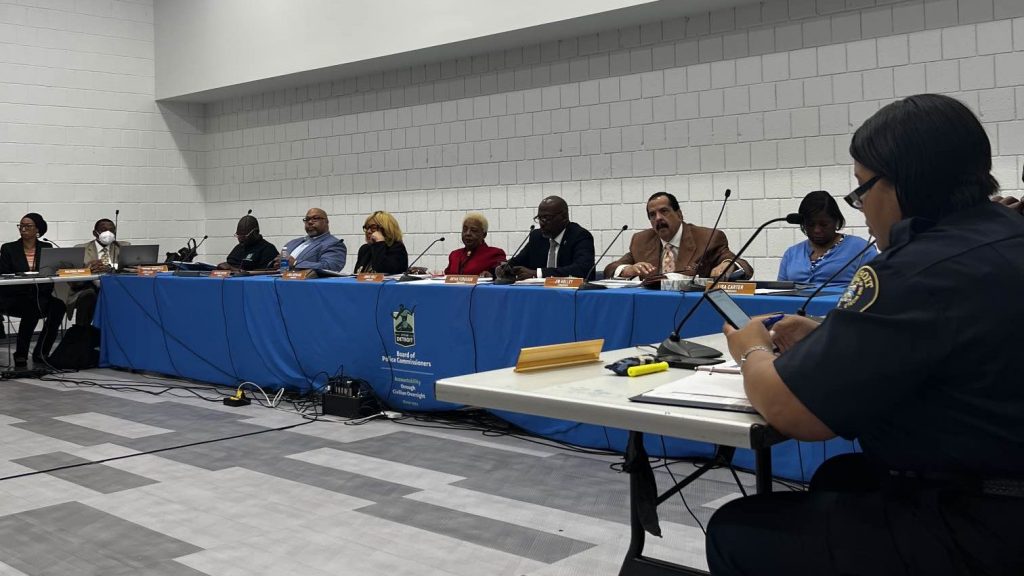Detroit police request more vehicle surveillance with 100 automated license plate readers
Under the proposal, the agency would install cameras at 25 intersections throughout the city, focusing on areas where vehicles are reported stolen and recovered.

The Board of Police Commissioners held a public hearing at Crowell Recreation Center on Thursday, May 11 to discuss the plan, with input from the Detroit Police Department and concerned community members.
Detroit could install 100 automated license plate readers under a proposal being considered by the city’s citizen-led police oversight panel.
The $5 million contract with Motorola Solutions would be paid through federal funding from the American Rescue Plan Act. Detroit City Council tabled the deal as outreach efforts continue, an action mandated through the city’s Community Input Over Government Surveillance (CIOGS) ordinance.
The Board of Police Commissioners held a public hearing at Crowell Recreation Center on Thursday, May 11 to discuss the plan, with input from the Detroit Police Department and concerned community members.
“We are up 666 auto thefts over this time last year,” Deputy Police Chief Franklin Hayes told commissioners at the meeting. “We are asked to do something.”
83 license plate readers are deployed on various roadways today, Hayes reported, saying the vehicle surveillance technology has been in place since 2017. Under the proposal, the agency would install groups of four high-speed cameras at 25 intersections throughout the city, focusing on areas where vehicles are reported stolen and recovered.
“We are stewards of the technology that the community allows us to use,” said Hayes. “There have been zero reports of this technology being misused and there’s been no discipline associated with it.”
Some police oversight officials criticized the plan, expressing frustration that DPD had already enacted a surveillance policy without their permission.
“It’s not only a waste of money, but it violates people’s civil liberties,” Police Commissioner Willie Burton told WDET. “No one wants to feel surveilled. No one wants to feel profiled.”
Representatives with the American Civil Liberties Union are opposing the program’s expansion, saying location data can reveal details about the religious, sexual and political activities of motorists.
“Gathering and storing data on people who are simply going about their daily lives is invasive governmental overreach,” Gabrielle Dresner, a policy strategist with the ACLU of Michigan, told police commissioners.
“The right to privacy is fundamental to a free society and the warrantless dragnet surveillance from [license plate readers] is a violation of that right.”
Others shared concerns that data from license plate readers would be shared with immigration enforcement and other third parties. DPD could share the surveillance data “with over 2,000 other agencies,” per Detroit’s proposed contract with Motorola Solutions. The technology would allow the city to purchase “commercial data” from financial institutions like asset recovery agencies and vehicle manufacturers searching for specific plates.
“I’m against it for the simple fact of technological racism,” community activist Meeko Williams told commissioners. “I am tired of being surveilled!”
Detroit’s surveillance programs are facing increased scrutiny. The National Institute of Justice gave Project Green Light, a police surveillance program in place at many city businesses, a “no effects” rating last year. A lawsuit seeks to void Detroit’s contracts with SoundThinking, the company previously known as ShotSpotter specializing in gunshot detection, claiming city officials failed to fulfill requirements in the CIOGS ordinance.
“This is a city of surveillance,” community activist Bobbi Johnson told WDET. “And the only reason we’re doing this is because it’s a city of color.”
Trusted, accurate, up-to-date.
WDET strives to make our journalism accessible to everyone. As a public media institution, we maintain our journalistic integrity through independent support from readers like you. If you value WDET as your source of news, music and conversation, please make a gift today.
